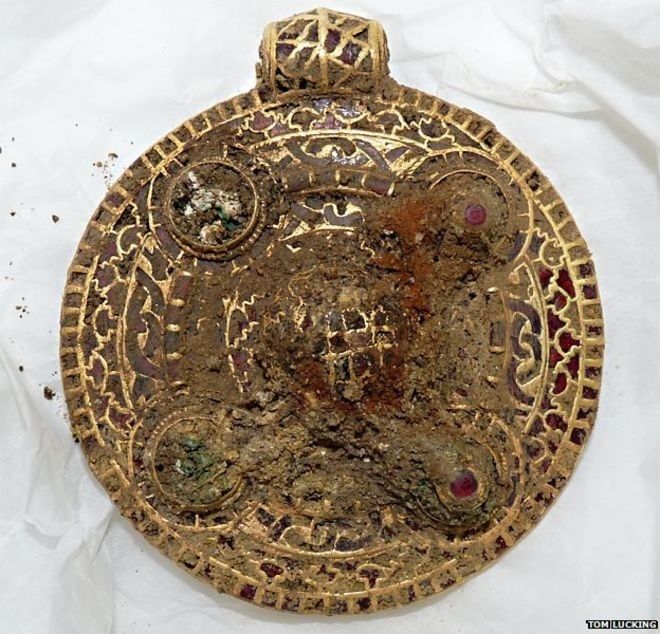Post by UKarchaeology on Sept 26, 2015 22:31:34 GMT

A student who unearthed an "outstanding" piece of Anglo-Saxon jewellery believes it could be worth tens of thousands of pounds.
Tom Lucking, 23, found the gold pendant, inlaid with a "profusion" of garnets, while metal detecting on farmland just before Christmas.
The 7cm (2.8in) item has been described by treasure experts to be of "national significance".
It is thought its owner may have had royal connections.
The pendant was discovered by landscape history student Mr Lucking in south Norfolk along with a female skeleton and a number of other coins and jewellery.
He initially detected a bronze bowl which, upon investigation, revealed a grave belonging to a woman.
"We knew there was something in that area of the grave, but no-one was expecting anything so significant," said Mr Lucking, from Felixstowe.
'Royal circles'
"This pendant is particularly well made, of real quality and clearly features commissioned [specially-cut] garnets.
"If you look at a piece from the Staffordshire Hoard or Sutton Hoo - this is up there with that level of quality."
Coins in the grave have suggested the skeleton and jewellery date from circa 630-650AD.
"It would seem we have something of major significance," said Dr Andrew Rogerson of Norfolk County Council's Heritage Environment Services (HES), who described the pendant as one of the "most elaborate...ever found".
Dr Rogerson said he thought the owner was "somebody of considerable note" who would have "most certainly mixed in royal social circles".
University of East Anglia (UEA) student Mr Lucking, who lives in Bowthorpe on the outskirts of Norwich, said the importance of his find "hasn't sunk in really".
It is too early to give the pendant an exact value but it is likely to run into tens of thousands, he said.
Once the pendant has been subjected to a treasure inquest, experts hope it will be acquired by Norwich's Castle Museum.
(pics & source at: www.bbc.co.uk/news/uk-england-norfolk-31659025 )
